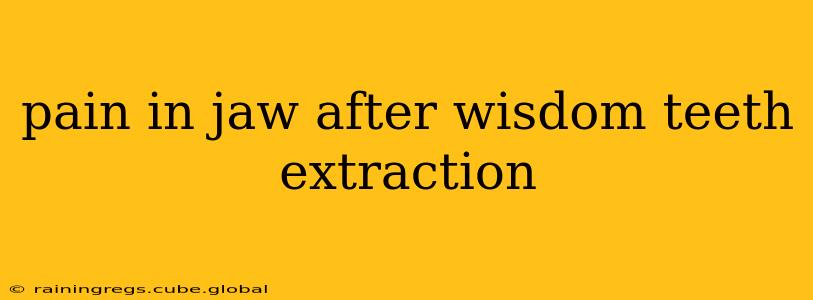Wisdom tooth extraction is a common procedure, but recovering can be challenging. Many patients experience jaw pain afterward, and understanding why this happens and how to manage it is crucial for a smooth recovery. This comprehensive guide will address the causes, management, and potential complications of jaw pain following wisdom tooth extraction.
Why Does My Jaw Hurt After Wisdom Tooth Extraction?
Post-extraction jaw pain is a common occurrence, stemming from several factors:
-
Surgical Trauma: The surgical removal of wisdom teeth inevitably causes trauma to the surrounding tissues, including the jawbone and muscles. This trauma leads to inflammation and pain. The more complex the extraction (e.g., impacted wisdom teeth requiring bone removal), the more significant the pain may be.
-
Inflammation and Swelling: Your body's natural inflammatory response to the surgery contributes significantly to jaw pain. Swelling can put pressure on nerves and surrounding structures, exacerbating the discomfort.
-
Dry Socket: This complication, also known as alveolar osteitis, occurs when the blood clot protecting the extraction site dislodges or dissolves prematurely. This exposes the underlying bone and nerve endings, resulting in severe, throbbing pain that often radiates to the jaw.
-
Referred Pain: Pain from the extraction site can sometimes be felt in other areas, like the jaw, ear, or temple. This is known as referred pain and is due to the complex nerve network in the head and neck.
-
Infection: Though less common with proper aftercare, infection can cause significant jaw pain and other symptoms.
How Long Will Jaw Pain After Wisdom Teeth Extraction Last?
The duration of jaw pain varies greatly depending on the complexity of the surgery, individual healing rates, and adherence to post-operative instructions. Generally, you can expect some level of discomfort for the first few days. Most patients report significant pain reduction within a week, although some tenderness might persist for several weeks. Persistent or worsening pain warrants a call to your dentist or oral surgeon.
What Can I Do to Relieve Jaw Pain After Wisdom Teeth Extraction?
Managing jaw pain is vital for a comfortable recovery. Here are several effective strategies:
-
Follow your dentist's instructions: This is paramount! Your dentist will provide specific post-operative instructions, including pain medication regimens and care recommendations. Adhering strictly to these instructions is crucial for minimizing complications and pain.
-
Ice Packs: Applying ice packs to the affected area for 15-20 minutes at a time, several times a day, helps reduce swelling and numb the pain. Never apply ice directly to the skin; use a thin cloth barrier.
-
Over-the-counter pain relievers: Medications like ibuprofen or acetaminophen can effectively manage pain and inflammation. Always follow the recommended dosage and consult your dentist if you have any concerns about medication interactions.
-
Prescription pain medication: Your dentist may prescribe stronger pain relievers if necessary. Take these medications precisely as prescribed.
-
Saltwater rinses: Gently rinsing your mouth with warm saltwater helps keep the extraction site clean and promotes healing. Avoid forceful rinsing, which could dislodge the blood clot.
-
Soft foods: Stick to soft, easily chewed foods for the first few days to minimize strain on the jaw and extraction site. Examples include soup, yogurt, applesauce, and mashed potatoes.
-
Rest: Give your body ample time to rest and heal. Avoid strenuous activities that could increase pain and swelling.
Is Jaw Pain After Wisdom Teeth Extraction Normal?
Yes, some level of jaw pain is perfectly normal after wisdom teeth extraction. However, the intensity and duration of the pain should decrease over time. Severe, persistent, or worsening pain, accompanied by other symptoms like fever, excessive bleeding, or numbness, warrants immediate attention from your dentist or oral surgeon. These could indicate a serious complication.
What if My Jaw Pain is Severe or Doesn't Improve?
If your jaw pain is intense, unrelenting, or worsens despite following your dentist's instructions, contact your dentist or oral surgeon immediately. They can assess your situation, identify any potential complications (like a dry socket or infection), and provide appropriate treatment. Don't hesitate to seek professional help; early intervention can prevent more serious problems.
Can I Exercise After Wisdom Teeth Extraction?
Gentle exercise is generally fine after a few days, but avoid strenuous activities that could increase pain, bleeding, or swelling in the extraction area. Always listen to your body and stop if you experience any discomfort. Your dentist can offer specific guidance based on your individual recovery.
This information is intended for general knowledge and informational purposes only, and does not constitute medical advice. It is essential to consult with a qualified dental professional for any health concerns or before making any decisions related to your health or treatment.
